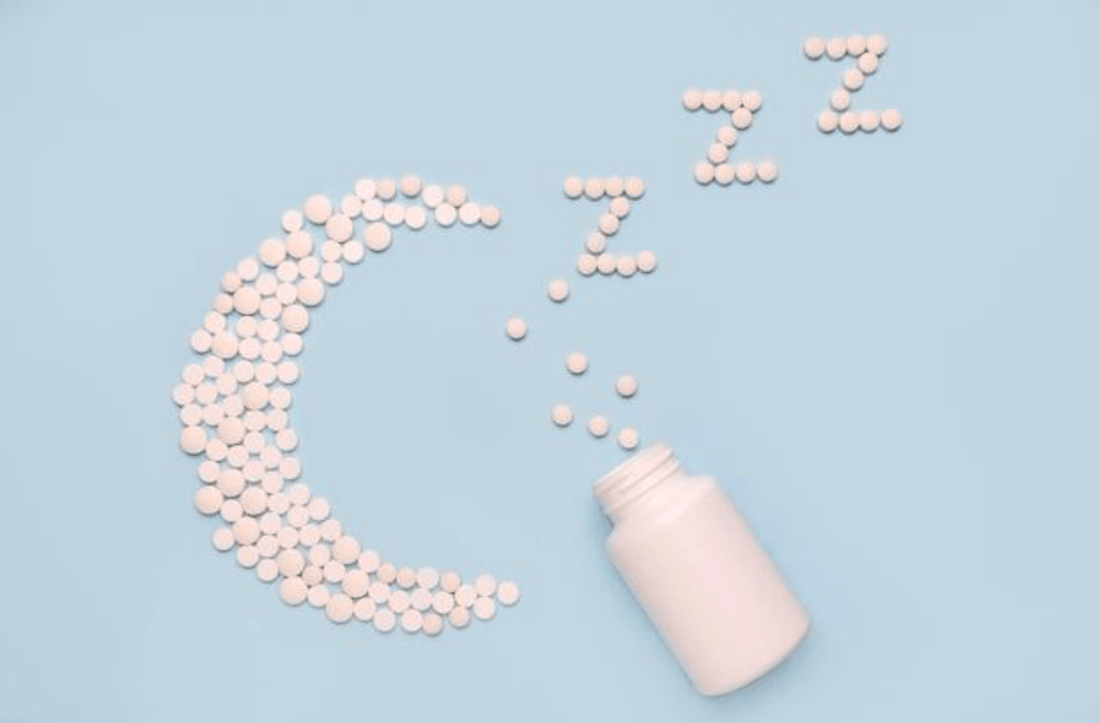Melatonin: Discover Benefits Beyond Sleep

Do you suffer from a sleep issue? Disrupted sleep is rising in North America, with people reaching for natural sleep aids. Melatonin resets sleep cycles and promotes quality sleep. In addition, melatonin provides health benefits beyond sleeping! In this article, you will learn about melatonin, reasons to consider taking it, and how melatonin is used for a good night’s sleep and beyond!
What is Melatonin?
Melatonin is a natural hormone produced by the pineal gland in the brain. The primary role of melatonin is the regulation of sleep by synchronizing circadian rhythms and managing your natural sleep (sleep-wake) cycle. This process responds to light cues, with melatonin secreted from the pineal gland in response to darkness.
The Protective Benefits of Melatonin
Beyond its primary role in sleep, melatonin serves as the body’s most potent free-radical scavenger. Its remarkable ability to mitigate oxidative damage means melatonin is a powerful antioxidant with significant anti-inflammatory, immune-boosting, and cellular energy (mitochondrial) regulating properties. This offers protective benefits for the heart and brain while supporting neurological and cognitive function.
In addition, quality sleep supports REM and deep sleep, which is crucial for nightly repair, regeneration, and detoxification of tissues in the body.
Melatonin Supplements: Sleep Benefits
When it comes to sleep, melatonin plays a crucial role in enhancing sleep quality. Supplementing with melatonin is beneficial for those struggling to fall asleep, including insomnia or difficulty falling back to sleep upon night-time waking.
Taking melatonin is also beneficial for jet lag relief (especially when travelling eastbound over more than two time zones) and supporting those with irregular sleep schedules (late nights and shift workers).
Melatonin Supplements: Health Benefits
Many people take melatonin strictly for its health benefits including:
- Enhances sleep
- Improves mood
- Anti-aging properties
- Provides heart protection
- Irritable bowel syndrome (IBS)
- Stimulates the immune system
- Seasonal affective disorder (SAD)
- Supports cognitive function & brain health
- Alleviates indigestion & gastroesophageal reflux disease (GERD)
Eight Reasons to Consider Supplementing with Melatonin:
1. Sleep Issues:
Melatonin enhances sleep quality and helps those with difficulty falling asleep or falling back asleep after waking at night. Supplement with melatonin 30 min to 1 hour before bedtime to help one fall asleep or upon night-time waking (please note, it is not advisable to take melatonin within a few hours of getting up in the morning).
2. Exposure to Artificial and Blue Light:
An extension of daylight hours through indoor lighting suppresses the production of melatonin at night, and exposure to low-intensity blue light (emitted from devices: computers, laptops, tablets, cell phones, etc.) directly before bedtime can negatively impact melatonin production and affect sleep quality.
3. Aging:
Melatonin production naturally decreases as we age partially due to the calcification of the pineal gland. Supplement with melatonin 30 min to 1 hour before bedtime.
4. Shift Work:
Melatonin relies on natural light cues for production. Studies show the negative impact on the immune system when environmental changes disrupt sleep-wake times and internal circadian rhythms, putting shift workers at risk of conditions associated with decreased immune function. Supplement with melatonin 1 hour before planning on falling asleep (note: avoid driving, direct sunlight, or bright light after taking melatonin).
5. Reduce Jet Lag:
Jet lag disrupts the circadian cycle of melatonin. Supplementing with melatonin 1 hour before the desired bedtime (after darkness) in the new destination will allow one to adapt to a new daily pattern and is particularly effective when travelling eastbound over 2 or more time zones.
6. Antioxidant and Anti-Inflammatory Properties:
Melatonin protects the brain, heart, nerves, and immune system due to its ability to free radical scavenge and prevent oxidative damage.
7. Non-Addictive Sleep Aid:
Melatonin is a non-addictive way to improve quality sleep by safely resetting circadian rhythms and natural sleep patterns.
8. No ‘Sleep Hangover’:
Unlike other sleep aids, melatonin does not produce a ‘sleep hangover’ or groggy feeling in the morning.
Practical Tips from a Visionary Pharmacist
Melatonin is an effective sleep aid. According to Harlan Lahti, a Vancouver-based Pharmacist, ‘almost everyone is melatonin deficient.’ In older people, melatonin production declines with age due to pineal calcification. Taking melatonin helps optimize brain function during the natural aging process.
From Mr. Lahti’s experience with melatonin, only half the population gets desired sleep results with 1 mg to 5 mg of melatonin. He suggests using a higher dose of melatonin (up to 10 mg) in sublingual form (under the tongue), which is safe and significantly increases the duration of REM and deep sleep.
Here are additional tips on taking melatonin. Upon waking, if you feel tired, reduce the dosage of melatonin. You want to wake feeling refreshed. Do not use melatonin during the daytime, as it can cause adverse effects and disrupt sleep at night. Additionally, do not drive or operate machinery for 5 hours after taking melatonin. Finally, taking melatonin combined with vitamin B6 enhances its biosynthesis and absorption.
The All-Important Sleep Hygiene Protocol:
Healthy sleep habits and bedtime routines are essential for a successful night's sleep. These simple steps will help set you up for success:
- Your sleep environment: Maintain a pitch-black room throughout the night with no ambient light from alarm clocks, streetlights, or bathroom lights. In addition, sleeping is best supported with a cool temperature and in a quiet and undisturbed environment.
- Eating and drinking: Limit or avoid heavy meals, alcohol, and caffeine consumption in the evening and before bed.
- Reduce exposure to bright light before bed: Melatonin relies on environmental light cues with darkness as the trigger to increase production and support sleep. Turn down the lights an hour before bed and avoid electronics emitting blue light at least 1 hour before bed.
To Sum It Up
Melatonin is an effective natural sleep aid and promotes gut health and enhances mood while offering protective benefits for the heart and cognitive function. Set yourself up for success with healthy sleeping habits and consider supplementing with melatonin to experience a quality night’s sleep and health benefits beyond sleeping!
Scientific References:
- Tan, D.X., Xu, B., Zhou, X., Reiter, R., Pineal Calcification, Melatonin Production, Aging, Associated Health Consequences and Rejuvenation of the Pineal Gland. Molecules. 2018 Jan 31;23(2):301.
- Minich, D.M., Henning, M., Darley, C., et al. Is Melatonin the “Next Vitamin D”?: A Review of Emerging Science, Clinical Uses, Safety, and Dietary Supplements. Nutrients. 2022 Oct; 14(19): 3934.
- Reiter, R.J., Tan, D.X., Rosales-Corral, S., et al. Mitochondria: Central Organelles for Melatonin's Antioxidant and Anti-Aging Actions. Molecules. 2018 Feb 24;23(2):509.
- Reiter RJ, Tan DX, Manchester LC, El-Sawi MR. Melatonin reduces oxidant damage and promotes mitochondrial respiration: implications for aging. Ann N Y Acad Sci. 2002 Apr; 959:238-50.
- Brzezinski A, Vangel MG, Wurtman RJ, Norrie G, Zhdanova I, et al. Effects of exogenous melatonin on sleep: a meta-analysis. Sleep Med Rev. 2005; 9:41–50.
- Sun, S-Y., Chen, G-H. Treatment of Circadian Rhythm Sleep-Wake Disorders. Curr Neuropharmacol. 2022;20(6):1022-1034.
- Lewy, A.J., Lefler, B.J., et al. The Circadian Basis of Winter Depression. Proc Natl Acad Sci U S A. 2006 May 9;103(19):7414-9.
- Pereira, R. Regression of Gastroesophageal Reflux Disease Symptoms Using Dietary Supplementation with Melatonin, Vitamins and Amino Acids: Comparison with Omeprazole. J Pineal Res. 2006 Oct;41(3):195-200.
- Kandil, T.S., Mousa, A.A., et al. The potential therapeutic effect of melatonin in Gastro-Esophageal Reflux Disease. BMC Gastroenterol. 2010 Jan 18:10:7.
- Cajochen C, Frey S, Anders D, Späti J, Bues M, Pross A, Mager R, Wirz-Justice A, Stefani O. Evening exposure to a light-emitting diodes (LED)-backlit computer screen affects circadian physiology and cognitive performance. J Appl Physiol. 2011 May;110(5):1432-8. Epub 2011 Mar 17.
- Touitou, Y., Reinberg, A., Touitou, D. Association between light at night, melatonin secretion, sleep deprivation, and the internal clock: Health impacts and mechanisms of circadian disruption. Life Sci. 2017 Mar 15:173:94-106.
- Fowler, S., Hoedt, E.C., Talley, N.J., Keely, S., Burns, G.L. Circadian Rhythms and Melatonin Metabolism in Patients with Disorders of Gut-Brain Interactions. Front Neurosci. 2022 Mar 9:16:825246.
- Boafo, A., Greenham, S., et al. Medications for sleep disturbance in children and adolescents with depression: a survey of Canadian child and adolescent psychiatrists. Child Adolesc Psychiatry Ment Health. 2020 Mar 10:14:10.
- Leger, D., Laudon, M., Zisapel, N. Nocturnal 6-Sulfatoxymelatonin Excretion in Insomnia and its Relation to the Response to Melatonin Replacement Therapy. The Am Journal of Medicine. 2004 Jan; 116:2:91-95
- Thangwong, P., Jearjaroen, P., et al. Melatonin Improves Cognitive Function by Suppressing Endoplasmic Reticulum Stress and Promoting Synaptic Plasticity During Chronic Cerebral Hypoperfusion in Rats. Biochem Pharmacol. 2022 Apr: 198:114980.
- Won, E., Na, K-S., Kim, Y-K. Associations between Melatonin, Neuroinflammation, and Brain Alterations in Depression. Int J Mol Sci. 2022 Jan; 23(1): 305.
- Lochner, A., Marias, E., Huisamen, B. Melatonin and cardioprotection against ischaemia/reperfusion injury: What's new? A Review. Journal of Pineal Research. 2018 Aug; 65:1
- Pyridoxine (vitamin B6) influence on endogenic melatonin production during the experiment. Georgian Med News. 2007 Dec;(153):35-8.
- Tavartkiladze AG, Simoniia GV, Kolbaia DT, Shalashvili AG, Petriashvili TG. Biochemical, Pharmacological and Clinical Aspects of Influencing Methioninc, Tryptophan, Pyridoxine (Vitamin B6), Ca2+ and High-Calorie Food on the Synthesis and Intensity of the Secretion of Melatonin. Georgian Med News. 2006 Mar;(132):121-3.
- Wahl, S., Engelhardt, M., Schaupp, P., Lappe, C., Ivanov, I.V. The Inner Clock - Blue Light Sets the Human Rhythm. J Biophotonics. 2019 Dec;12(12): e201900102.
- Talib, W.H. Melatonin and Cancer Hallmarks. Molecules. 2018 Feb 26;23(3):518.
- Cardinali, D.P., Srinivasan, V., et al. Melatonin and its Analogs in Insomnia and Depression. J Pineal Res. 2012 May;52(4):365-75.

















